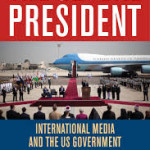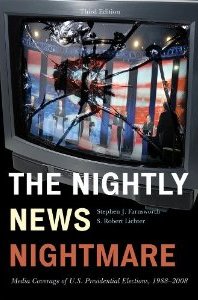Books

The Global President: International Media and the US Government
By Stephen J. Farnsworth, S. Robert Lichter and Roland Schatz
 In The Global President: International Communication and the US Government, scholars Stephen J. Farnsworth, S. Robert Lichter and Roland Schatz provide an expansive international examination of news coverage of US political communication, and the roles the US government and the Presidency play in an increasingly communicative and interconnected political world. This comprehensive yet concise text will engage and inform students in many intersecting disciplines, as it includes analyses of not just the Presidency, but US foreign policy and contemporary political media itself. The media developed to keep pace with the headwinds of political change are being asked more and more to adapt to and enhance the ways in which policy-makers, voters, and students make sense of the process of governance.
In The Global President: International Communication and the US Government, scholars Stephen J. Farnsworth, S. Robert Lichter and Roland Schatz provide an expansive international examination of news coverage of US political communication, and the roles the US government and the Presidency play in an increasingly communicative and interconnected political world. This comprehensive yet concise text will engage and inform students in many intersecting disciplines, as it includes analyses of not just the Presidency, but US foreign policy and contemporary political media itself. The media developed to keep pace with the headwinds of political change are being asked more and more to adapt to and enhance the ways in which policy-makers, voters, and students make sense of the process of governance.
The realities of an ever-changing political landscape are magnified nowhere more greatly than in the realm of foreign policy, and the stakes surrounding the need for quality communicational skills are no higher than at 1600 Pennsylvania Avenue because – when the voices of the US government speak – the world is listening. This book provides students a perfect entry point into the complex and amorphous relationship between media and government, where that relationship has been, and where it looks to be heading in the future.
Purchase from Amazon
Mediated Presidency: Television News & Presidential Governance
By Stephen J. Farnsworth, S. Robert Lichter
 Including late-breaking data from the Iraq occupation and the disastrous CBS News reports on Bush’s Vietnam-era National Guard Service, acclaimed media scholars Stephen J. Farnsworth and S. Robert Lichter examine news coverage of military policy, economic policy, and scandals from the last four U.S. presidencies, including the current controversial administration. Using a quarter-century of content analysis data, the authors demonstrate how the White House dominates Capitol Hill on every dimension of news coverage, undermining Congress’s attempt to compete as a co-equal branch before the public. At the same time, they show how the networks are steadily losing ground to new media outlets and suggest future paths our media mania may take.
Including late-breaking data from the Iraq occupation and the disastrous CBS News reports on Bush’s Vietnam-era National Guard Service, acclaimed media scholars Stephen J. Farnsworth and S. Robert Lichter examine news coverage of military policy, economic policy, and scandals from the last four U.S. presidencies, including the current controversial administration. Using a quarter-century of content analysis data, the authors demonstrate how the White House dominates Capitol Hill on every dimension of news coverage, undermining Congress’s attempt to compete as a co-equal branch before the public. At the same time, they show how the networks are steadily losing ground to new media outlets and suggest future paths our media mania may take.
The Nightly News Nightmare: Media Coverage of U.S. Presidential Elections, 1988-2008 (Third Edition)
By Stephen J. Farnsworth, S. Robert Lichter
 Acclaimed media scholars Stephen J. Farnsworth and S. Robert Lichter examine news coverage of presidential nomination and election campaigns from 1988 to 2008. The book focuses on changes in the amount, tone, and focus of news coverage in these different electoral contexts. Farnsworth and Lichter find that the news media, despite the wide variety of outlets, have consistent problems in terms of fairness and focus on substantive matters rather than the horse-race reporting of the latest polls. In addition to the extensive discussion of the 2008 campaign, the third edition offers far more discussion and evidence regarding the use of alternative media, including online content, in the most recent presidential election.
Acclaimed media scholars Stephen J. Farnsworth and S. Robert Lichter examine news coverage of presidential nomination and election campaigns from 1988 to 2008. The book focuses on changes in the amount, tone, and focus of news coverage in these different electoral contexts. Farnsworth and Lichter find that the news media, despite the wide variety of outlets, have consistent problems in terms of fairness and focus on substantive matters rather than the horse-race reporting of the latest polls. In addition to the extensive discussion of the 2008 campaign, the third edition offers far more discussion and evidence regarding the use of alternative media, including online content, in the most recent presidential election.
The Nightly News Nightmare: Television’s Coverage of U.S. Presidential Elections, 1988-2004 (Second Edition)
By Stephen J. Farnsworth, S. Robert Lichter
 Acclaimed media scholars Farnsworth and Lichter draw on the lessons of the last five presidential elections to show how network news coverage of what is arguably the nation’s most important political event has declined. Through extensive analysis of news content, the authors compare what the candidates said with what the networks say they said and judge the disparity a nightmare. What may make it even harder to sleep at night is that the authors go on to suggest that perhaps the candidates themselves do a better job of portraying the campaigns than those who used to be the trusted network guardians of the news.
Acclaimed media scholars Farnsworth and Lichter draw on the lessons of the last five presidential elections to show how network news coverage of what is arguably the nation’s most important political event has declined. Through extensive analysis of news content, the authors compare what the candidates said with what the networks say they said and judge the disparity a nightmare. What may make it even harder to sleep at night is that the authors go on to suggest that perhaps the candidates themselves do a better job of portraying the campaigns than those who used to be the trusted network guardians of the news.


